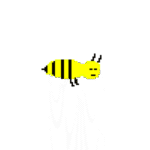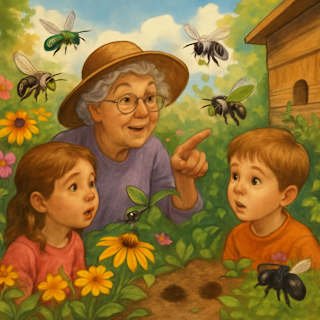A humorous story from a young honeybee’s perspective as she emerges and learns about colony life
Emerging Sticky
The first thing I noticed when I chewed my way out of my wax cell wasn’t the blinding light or the overwhelming buzz of fifty thousand sisters—it was that I was absolutely, completely, and utterly sticky. Like, covered-in-honey-and-rolled-in-pollen sticky.
Which, as it turns out, is pretty much the default state for honeybees. Who knew?
“Welcome to the world, 47,821!” chirped a cheerful voice above me.
I looked up to see another bee hovering nearby, her wings beating so fast they were just a blur. She had that confident, I-know-what-I’m-doing look that I definitely did not possess.
“47,821?” I squeaked, my voice barely audible over the colony’s constant humming. “Is that my name?”
“Oh honey,” she laughed—and yes, the pun was intentional because apparently bees think they’re comedians—”we don’t have time for names around here.
I’m Worker Bee 23,449, but you can call me Twenty-Three for short. I’ll be showing you the ropes today.”
I tried to stand up, wobbled dramatically, and face-planted directly into the cell next to mine.
A muffled voice from inside said, “Hey! I’m trying to emerge here! Some of us are still on bee time!”
“Sorry!” I called out, scrambling to my feet. My legs felt like they were made of cooked spaghetti, and my wings… well, let’s just say they had their own agenda.
Twenty-Three buzzed with amusement. “First day jitters. Completely normal. Now, let’s get you oriented.
Meet The Hive
The Queen
See that massive bee over there?” She pointed to what looked like a small aircraft carrier with wings. “That’s our Queen. She’s… well, she’s the Queen. Try not to stare.”
I immediately stared. The Queen was enormous, surrounded by a entourage of worker bees who seemed to be hanging on her every word. Or pheromone. I wasn’t really sure how royal communication worked yet.
“What’s she doing?” I whispered.
“Laying eggs. About 2,000 a day. It’s her thing.” Twenty-Three started walking toward the edge of our section. “Come on, we need to figure out what job you’re suited for.”
The Drones
What do those guys do?
Not much? Those are the male bees. They pretty much laze around the hive all day and eat.
One of them gets to go on a date with the queen, otherwise we get rid of them every fall by pushing them out of the hive and create news ones every season. Well, let’s get moving, shall we?
The Workers
As we made our way through the hive, I marveled at the organized chaos around us. Bees were everywhere, each seemingly knowing exactly what they were supposed to be doing.
Some were building perfect hexagonal cells with the precision of tiny architects, others were processing nectar with the intensity of chemists, and still others were engaged in what appeared to be interpretive dance.
The Waggle Dancers
“What are they doing?” I asked, pointing at the dancers.
“Oh, that’s the Waggle Dance,” Twenty-Three explained matter-of-factly. “Forty-Seven just found a patch of sunflowers about 200 meters northeast.
She’s giving everyone the GPS coordinates through choreography.”
“We navigate by dancing?”
“Would you prefer PowerPoint presentations?”
Point taken.
Housekeeping
We approached a group of bees who were meticulously cleaning cells. They moved with the focused determination of a cleaning crew preparing for a royal inspection.
“This might be perfect for you,” Twenty-Three suggested. “House keeping. It’s honest work, and someone’s got to do it.”
I watched them work for a moment, then accidentally knocked over a small pile of wax shavings with my still-uncoordinated wing.
The cleaning crew stopped and stared at me with the kind of look usually reserved for someone who puts pineapple on pizza.
“Maybe not housekeeping,” Twenty-Three muttered, quickly steering me away.
Childcare
Next, we visited the nursery section, where older worker bees were tending to developing larvae. They moved with gentle efficiency, feeding the babies and keeping them comfortable.
“Childcare?” Twenty-Three suggested hopefully.
I leaned in to get a better look at one of the larvae and accidentally sneezed—apparently, I was allergic to something in the royal jelly.
The sneeze was so powerful it blew the poor larva right out of its cell. It landed with a tiny plop in the cell next door.
The nursery workers glared at me with the intensity of a thousand suns.
“Definitely not childcare,” Twenty-Three said, physically pulling me away before I could cause any more chaos.
Construction Crew
We tried the construction crew next. These bees were the architects of our world, building the perfect hexagonal cells that made our home possible. They worked with mathematical precision, each cell exactly the right size and shape.
“This could work,” Twenty-Three said encouragingly. “It’s all about precision and—”
I tried to help by adding a bit of wax to a partially completed cell. Unfortunately, my “addition” looked more like abstract art than functional architecture.
The cell now had what could generously be called “character” but could more accurately be described as “structurally unsound.”
The head construction worker, a grizzled old bee with wax permanently stuck to her antennae, took one look at my handiwork and shook her head. “Kid’s got enthusiasm,” she said diplomatically. “Maybe she’d be better suited for… outdoor work.”
The Foragers
“Outdoor work?” I perked up. That sounded exciting.
Twenty-Three’s expression suggested it was less exciting than I imagined. “Well, there are foraging duties…”
We made our way toward the entrance of the hive, where bees were coming and going in a constant stream.
Some returned heavily laden with pollen, looking like they’d been dipped in yellow powder. Others carried nectar in their honey stomachs—which, yes, is apparently a real thing we have.
“Foraging requires navigation skills, flower identification, weather assessment, and the ability to communicate complex spatial information through dance,” Twenty-Three explained. “Plus, you have to avoid birds, spiders, pesticides, and humans with spray bottles.”
“Humans with spray bottles?”
“Trust me, you don’t want to know.”
Just then, a forager landed nearby, looking frazzled. “The roses in sector seven are covered in aphids,” she announced. “And the sunflowers in sector twelve are apparently fake—some human put up plastic ones in their garden. I spent twenty minutes trying to extract nectar from polyester.”
I was starting to understand why indoor work was preferred.
The Guards
“There’s also guard duty,” Twenty-Three continued, pointing to the entrance where several intimidating-looking bees were stationed. They had the no-nonsense demeanor of bouncers at an exclusive club.
As we watched, a wasp approached the entrance. The guard bees immediately formed a defensive line.
“State your business!” one of them buzzed aggressively.
“I’m here for the honey,” the wasp replied with obvious criminal intent.
“Yeah, that’s not happening,” the lead guard replied. What followed was a brief but intense aerial battle that ended with the wasp retreating rapidly, muttering something about “bee privilege.”
“Guard duty requires quick reflexes, good judgment, and the ability to identify threats,” Twenty-Three explained. “Think you’re up for it?”
At that moment, a butterfly fluttered past, and I instinctively waved at it in a friendly manner. Twenty-Three facepalmed with her wing.
“We need to find you something,” she sighed. “The colony depends on everyone contributing.”
The Story Teller
Just then, we heard a commotion from the honey storage area. A group of bees were gathered around something, buzzing excitedly.
“What’s happening?” I asked.
We pushed through the crowd to find a bee standing in front of several cells of honey, gesturing dramatically.
“And then,” she was saying, “the human child pointed at me and said, ‘Look, Mommy, a flying teddy bear!’ Can you believe it? A flying teddy bear! The complete lack of biological understanding! The sheer taxonomical ignorance!”
The crowd buzzed with laughter and supportive outrage.
“Who’s that?” I whispered to Twenty-Three.
“Oh, that’s Ninety-Nine. She’s our storyteller. Every day she comes back from foraging with the most ridiculous stories about human interactions. Keeps everyone entertained during the long work hours.”
I watched Ninety-Nine continue her tale, describing a human who tried to “help” a bee by offering it a tiny umbrella during a light rain. Her timing was perfect, her delivery spot-on, and the crowd was eating it up.
“I want to do that,” I said suddenly.
“What, deal with ridiculous humans?”
“No, tell stories. Make everyone laugh.”
Twenty-Three looked at me thoughtfully. “You know what? That might actually work, she smiled.
The Comedy Correspondent
The colony needs morale as much as it needs honey. And you’ve certainly provided enough comic relief today to prove you’ve got the material.”
You mean it? I asked. Certainly, seems it’s meant to be, said Twenty-Three. And that’s how I became the hive’s first official Comedy Correspondent.
Every day, I’d go out with the foraging teams and collect not just pollen and nectar, but stories.
Stories about humans who tried to communicate with us through interpretive dance, stories about dogs who thought they could catch us by jumping three feet in the air, stories about the ongoing territorial disputes between us and the wasps next door.
Turns out, every colony needs someone whose job it is to remind everyone that even though we’re incredibly organized, incredibly efficient, and incredibly important to the ecosystem, we’re also pretty ridiculous sometimes. And that’s perfectly okay.
Because at the end of the day, whether you’re building perfect hexagons or accidentally destroying them, whether you’re performing precise waggle dances or tripping over your own wings, we’re all just doing our best to keep the hive buzzing along.
Even if some of us are slightly stickier than others.




